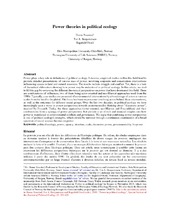| dc.contributor.author | Svarstad, Hanne | |
| dc.contributor.author | Benjaminsen, Tor A | |
| dc.contributor.author | Overå, Ragnhild | |
| dc.date.accessioned | 2019-05-29T07:43:41Z | |
| dc.date.available | 2019-05-29T07:43:41Z | |
| dc.date.issued | 2018 | |
| dc.Published | Svarstad H, Benjaminsen TA, Overå R. Power theories in political ecology. Journal of political ecology. 2018;25(1):350-363 | eng |
| dc.identifier.issn | 1073-0451 | |
| dc.identifier.uri | https://hdl.handle.net/1956/19789 | |
| dc.description.abstract | Power plays a key role in definitions of political ecology. Likewise, empirical studies within this field tend to provide detailed presentations of various uses of power, involving corporate and conservation interventions influencing access to land and natural resources. The results include struggle and conflict. Yet, there is a lack of theoretical elaboration showing how power may be understood in political ecology. In this article, we start to fill this gap by reviewing the different theoretical perspectives on power that have dominated this field. There are combinations of influences, two of them being actor-oriented and neo-Marxist approaches used from the 1980s. Typically, case studies are presented of environmental interventions by a broad range of actors at various scales from the local to the global. The focus has been on processes involving actors behind these interventions, as well as the outcomes for different social groups. Over the last two decades, in political ecology we have increasingly seen a move in power perspectives towards poststructuralist thinking about "discursive power", inspired by Foucault. Today, the three approaches (actor-oriented, neo-Marxist and Foucauldian) and their combinations form a synergy of power perspectives that provide a set of rich and nuanced insights into how power is manifested in environmental conflicts and governance. We argue that combining power perspectives is one of political ecology's strengths, which should be nurtured through a continuous examination of a broad spectrum of social science theories on power. | en_US |
| dc.language.iso | eng | eng |
| dc.publisher | University of Arizona Libraries | eng |
| dc.relation.uri | https://journals.uair.arizona.edu/index.php/JPE/article/view/23044/21794 | |
| dc.rights | Attribution CC BY | eng |
| dc.rights.uri | http://creativecommons.org/licenses/by/4.0 | eng |
| dc.subject | political ecology | eng |
| dc.subject | power | eng |
| dc.subject | agency | eng |
| dc.subject | structure | eng |
| dc.subject | scale | eng |
| dc.subject | discursive power | eng |
| dc.subject | governmentality | eng |
| dc.subject | biopower | eng |
| dc.title | Power theories in political ecology | eng |
| dc.type | Peer reviewed | en_US |
| dc.type | Journal article | en_US |
| dc.date.updated | 2019-01-21T08:57:41Z | |
| dc.description.version | publishedVersion | |
| dc.rights.holder | Copyright 2018 The Author(s) | en_US |
| dc.identifier.doi | https://doi.org/10.2458/jpe.v25i1 | |
| dc.identifier.cristin | 1609873 | |
| dc.source.journal | Journal of political ecology | |
| dc.relation.project | Norges forskningsråd: 250975 | |

